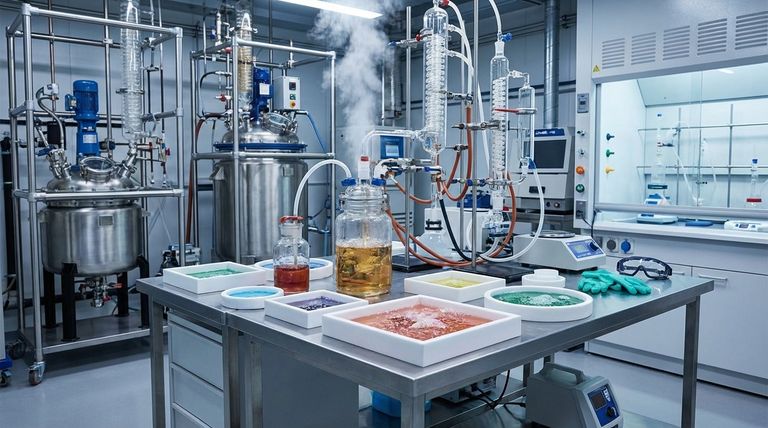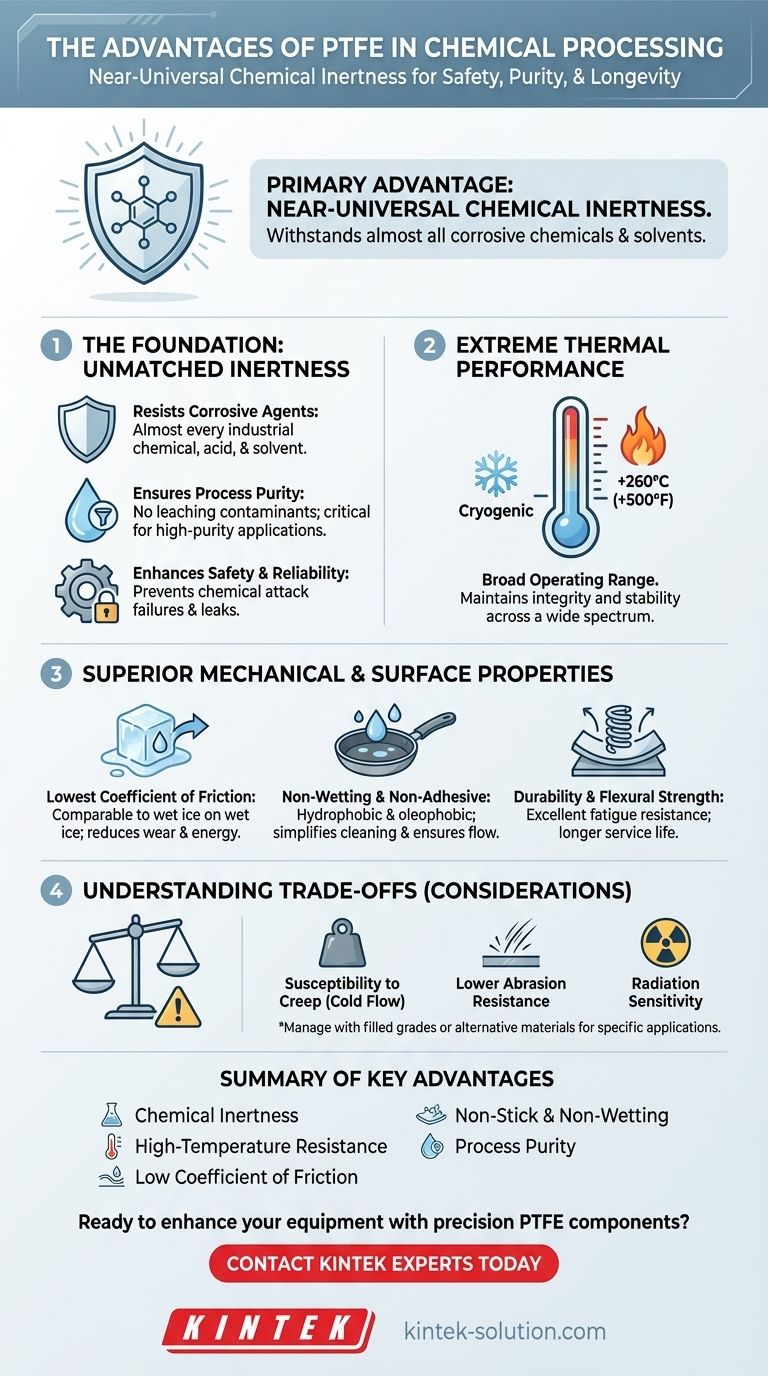The primary advantage of PTFE in chemical processing is its near-universal chemical inertness. This means it can withstand almost all corrosive chemicals and solvents across a vast temperature range without degrading. This resistance ensures equipment longevity, maintains process purity, and drastically enhances operational safety by preventing catastrophic failures.
The decision to use PTFE is not just about material selection; it is a strategic choice to minimize operational risk. Its unique combination of chemical, thermal, and mechanical properties makes it one of the most reliable materials for ensuring safety, uptime, and product purity in aggressive chemical environments.

The Foundation: Unmatched Chemical Inertness
The core value of Polytetrafluoroethylene (PTFE) originates from its molecular structure. The exceptionally strong bonds between its carbon and fluorine atoms create a material that is highly unreactive.
Resisting Virtually All Corrosive Agents
PTFE is resistant to nearly every industrial chemical, acid, and solvent you will encounter. Its only known vulnerabilities are to molten alkali metals and certain highly reactive fluorinating agents.
This fundamental inertness prevents the material itself from becoming a point of failure in your process, even under high temperatures and pressures.
Ensuring Process Purity
Because PTFE does not react with the substances it contacts, it does not leach contaminants into the process media. This is critical in high-purity applications like pharmaceuticals or specialty chemicals, where even trace impurities can ruin a batch.
Enhancing Safety and Reliability
Component failure due to chemical attack is a significant safety risk in chemical processing. Using PTFE for critical components like gaskets, seals, and linings directly mitigates this risk, preventing leaks and potential equipment failure.
Performance Under Extreme Thermal Stress
Chemical processes rarely occur at room temperature. PTFE’s ability to maintain its integrity across a wide temperature spectrum is a key advantage.
A Broad Operating Temperature Range
PTFE maintains its outstanding properties in continuous service at temperatures up to +260°C (+500°F). It also retains a useful degree of flexibility at cryogenic temperatures, making it a viable choice for a vast range of thermal conditions.
Maintaining Stability at High Temperatures
Unlike many polymers that soften or degrade significantly with heat, PTFE retains its chemical resistance and mechanical stability at elevated temperatures. This ensures predictable, reliable performance throughout thermal cycles.
Superior Mechanical and Surface Properties
Beyond its core resistance, PTFE’s physical characteristics deliver significant operational efficiencies.
The Lowest Coefficient of Friction
PTFE has one of the lowest coefficients of friction of any solid material, comparable to wet ice on wet ice. This inherent lubricity reduces wear on moving parts, lowers energy consumption in pumps and valves, and prevents galling.
Non-Wetting and Non-Adhesive Surfaces
The material is both hydrophobic (resists water) and oleophobic (resists oil). This non-stick, non-wetting surface prevents process media from adhering to components, which simplifies cleaning, ensures consistent flow, and can even create a self-cleaning effect in certain applications.
Durability and Flexural Strength
The strong intrapolymer bonds give PTFE high flexural strength and excellent fatigue resistance. Components made from PTFE have a longer service life, reducing the frequency of replacement and associated downtime.
Understanding the Trade-offs
No material is perfect. While its advantages are profound, it is critical to understand PTFE's limitations to ensure its proper application.
Susceptibility to Creep
PTFE is a relatively soft material and can be susceptible to "creep" or cold flow. Under a sustained compressive load, such as in a gasket, it may slowly deform over time. This is often managed by using filled grades of PTFE that incorporate glass, carbon, or other materials to improve mechanical strength.
Lower Resistance to Abrasion
Because it is a soft polymer, pure PTFE does not perform well in applications with high mechanical abrasion or slurry erosion. In these cases, other materials or specially filled PTFE compounds may be more suitable.
Radiation Sensitivity
PTFE is not recommended for use in high-radiation environments, as exposure can cause the polymer chains to break down, leading to embrittlement and a loss of mechanical properties.
Making the Right Choice for Your Application
Selecting PTFE is about aligning its specific strengths with your most critical operational goals.
- If your primary focus is process purity and preventing contamination: PTFE's chemical inertness and non-stick surface make it the ideal choice for linings, tubing, and seals.
- If your primary focus is operational uptime and safety: The material's extreme chemical and thermal resistance ensures component longevity and reliability in the most aggressive environments.
- If your primary focus is efficiency in dynamic systems: PTFE's ultra-low coefficient of friction is invaluable for reducing wear and energy use in seals, bearings, and valve components.
Ultimately, specifying PTFE for critical components is a direct investment in the long-term reliability and safety of your chemical processing operations.
Summary Table:
| Key Advantage | Description |
|---|---|
| Chemical Inertness | Resists virtually all corrosive chemicals, acids, and solvents. |
| High-Temperature Resistance | Performs reliably from cryogenic temperatures up to 260°C (500°F). |
| Low Coefficient of Friction | Reduces wear and energy consumption in pumps and valves. |
| Non-Stick & Non-Wetting | Prevents material adhesion, simplifies cleaning, and ensures flow. |
| Process Purity | Prevents contamination by not leaching into process media. |
Ready to enhance the safety and reliability of your chemical processing equipment with precision PTFE components?
KINTEK specializes in the custom fabrication of high-performance PTFE seals, liners, labware, and more for the semiconductor, medical, laboratory, and industrial sectors. Our expertise ensures your components are built for maximum chemical resistance, longevity, and operational uptime.
Contact our experts today to discuss your specific application needs, from prototype to high-volume production.
Visual Guide

Related Products
- Custom PTFE Parts Manufacturer for Teflon Containers and Components
- Custom PTFE Parts Manufacturer for Teflon Parts and PTFE Tweezers
- Custom PTFE Square Trays for Industrial and Laboratory Use
- Custom PTFE Measuring Cylinders for Advanced Scientific and Industrial Applications
- Custom PTFE Sleeves and Hollow Rods for Advanced Applications
People Also Ask
- What industries commonly use PTFE and why? Unlock the Power of PTFE for Extreme Environments
- In which industries is PTFE commonly used? Key Applications for Chemical & Thermal Resistance
- How does PTFE benefit construction applications? Enhance Durability & Safety in Demanding Environments
- How does PTFE perform in chemically corrosive environments? Unmatched Chemical Immunity & Reliability
- What properties make Teflon ideal for medical applications? Discover Its Critical Role in Safety & Performance
- How does PTFE perform in terms of chemical resistance? The Ultimate Guide to Inert Sealing & Lining
- What are the dielectric properties of PTFE products? Ensure Stable, High-Performance Electrical Insulation
- What is the chemical name for Teflon, and what is its abbreviation? Unveiling PTFE’s Unique Properties



















